For the 2024 International Women in Engineering Day, Royal Academy of Engineering senior manager of the Africa Programmes Catriona MacArthur highlights some of the inspirational Africa Prize alumni transforming live.
Across the world, engineering has historically been a male-dominated field. This is particularly the case in Africa where women engineers remain significantly underrepresented. According to a 2021 UNESCO survey, African countries had some of the lowest levels of female representation in engineering and technology. Barriers include lack of access to education, gender biases and stereotypes, as well as lack of opportunities and role models.
To support women engineers in Africa with overcoming these barriers, over the last ten years the Africa Prize for Engineering Innovation has supported and empowered innovators who are tackling some of the continent’s biggest challenges through engineering. By offering mentorship, funding, and a platform for their ideas, the Africa Prize has helped many ambitious, talented women realise their innovative potential to drive meaningful change in their communities. These are just some of the inspirational Africa Prize alumni who are transforming lives across the continent.
Esther Kimani
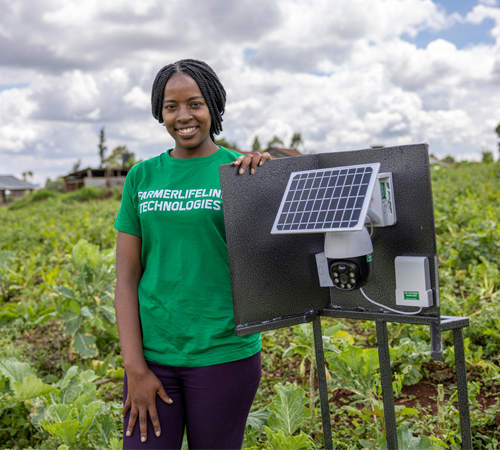
Esther Kimani, Africa Prize 2024 winner
In June 2024, Esther became the third woman to win the Africa Prize for her AI-enabled technology that detects pests to protect crops. Esther’s parents were smallholder farmers, who were would often lose up to 40% of their crops each farming season. This device was developed to address the loss of income from pests and disease. It works by using a high-sensitivity solar-powered camera system mounted on an adjustable stand, capable of reaching up to five metres, that continuously captures images of crops within 600 metres. Using computer vision and machine learning, it detects and identifies crop pests, pathogens, and diseases, and then notifies farmers via SMS with a diagnosis and recommendations for treatment.
As well as winning the 2024 Africa Prize for Engineering Innovation, Esther’s hard work and innovation has led to a nomination for the prestigious Earthshot Prize.
Beth Koigi
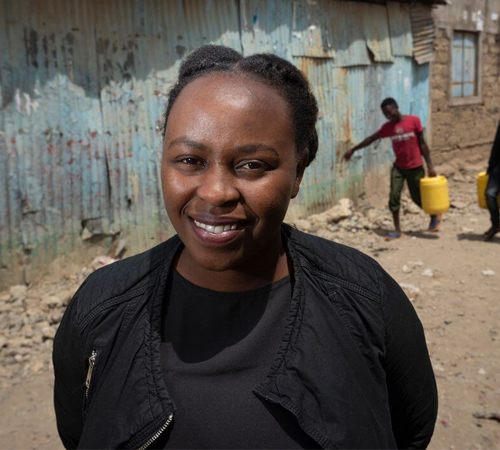
Beth Koigi, Africa Prize 2022 alumni
Kenyan entrepreneur, Beth Koigi, has devoted her career to addressing water scarcity in arid and semi-arid regions. Her company Majik Water was born out of the severe drought in Kenya from 2016 to 2017, which brought about widespread water rationing. During this period, Cape Town was also on the brink of 'Day Zero,' highlighting the urgency of water crises on the continent and beyond. Faced with the dire situation of not just unsafe drinking water but insufficient water altogether, Beth began exploring solutions.
With a shared vision of ensuring universal access to clean drinking water, Beth and her co-founders developed an all-in-one system that harvests, stores and then dispenses water. These custom-built water dispensers – or water ‘ATMs’ – allow communities to pay only for as much water as they need. This innovation is particularly crucial for regions where traditional water sources are unreliable.
Beth and her team have installed devices across Kenya, South Africa, and India, including industrial machines and smaller units for families, supporting more than 1500 users.
Catherine Wanjoya
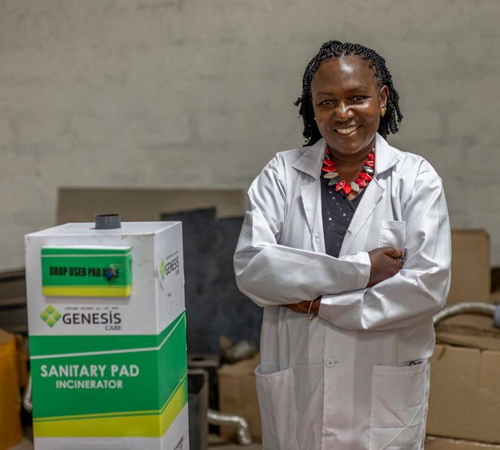
Catherine Wanjoya, Africa Prize 2022 alumni
Catherine Wanjoya is also a Kenyan entrepreneur, whose journey to improve menstrual health management began after witnessing the struggles women in her rural community faced in accessing sanitary pads. To improve the wellbeing of women and girls in her area, she developed the convenient Genesis Care dispenser that enables the purchase of single sanitary pads at an affordable price.
Catherine also tackled the resulting issue of sanitary waste disposal by creating a mobile incinerator. This small, portable device can burn up to 800C, ensuring the safe disposal of used pads. During the COVID-19 pandemic, these incinerators were adapted to safely dispose of PPE, showcasing the versatility and impact of her innovation.
Genesis Care dispensers have been installed at 83 sites, translating to over 58,100 users since 2019.
Juveline Ngum Ngwa
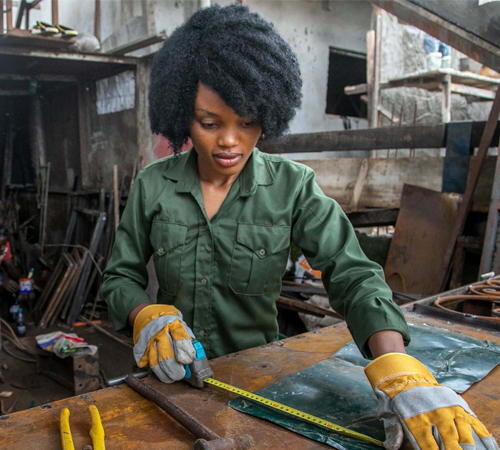
Juveline Ngum Ngwa, Africa Prize 2022 alumni
Juveline Ngum Ngwa, CEO of BleagLee, grew up in Bamenda, Western Cameroon, where open waste burning caused severe respiratory issues from a young age. Approximately 80 to 85% of Cameroon’s solid waste – which can be over 350 million tonnes a year – is burned in open fields because communities lack safe alternatives for disposal. The release of millions of tonnes of greenhouse gases, such as carbon dioxide, into the atmosphere contributes to climate change and affects the health of millions of people.
To tackle these challenges, Juveline founded BleagLee in 2019. Using AI, BleagLee identifies open waste burning and collaborates with local collectors to process waste into biofuels, creating jobs and reducing harmful emissions. BleagLee has diverted over 22,300 tonnes of waste, positively impacting upwards of 560,000 lives and contributing to a cleaner environment.
Aisha Raheem
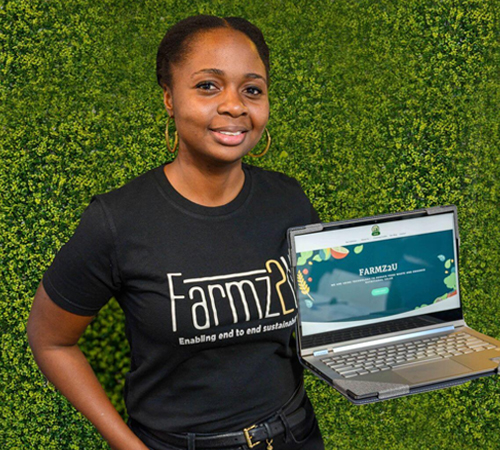
Aisha Raheem, Africa Prize 2020 alumni
Aisha Raheem, a strategy consultant turned entrepreneur, founded Farmz2U after a personal health scare prompted her to pursue a healthier lifestyle. This journey revealed the inefficiencies in the food industry and inspired her to create a solution to reduce food waste and improve nutritional intake. Farmz2U is a digital platform that assists farmers in planning their crops more effectively, ultimately preventing food waste and enhancing productivity.
Farmz2U provides farmers with tailored advice based on their land size, crop choice, budget, and profit goals. The platform offers detailed guidance on seedling quantities, fertiliser and pesticide use, and crop-specific training materials. Additionally, it connects farmers with market demand, and provides access to storage solutions and real-time weather updates.
Aisha's innovation streamlines agricultural processes and empowers farmers to make data-driven decisions, ensuring better yields and reducing food waste. Her work with Farmz2U shows how technology can revolutionise traditional industries and address global challenges sustainably.
Forging change
These notable alumni of the Africa Prize have utilised their personal perspectives and experiences to develop sustainable and socially impactful solutions. Representing a voice that has long been absent from engineering, their innovations demonstrate how the perspectives of women are vital for realising new innovations that positively impact all corners of society.
Across the continent, women are forging change and addressing complex global challenges such as water scarcity, health management, waste disposal, and food security. These innovators have not only tackled immediate problems within their communities but have also made an impact worldwide while inspiring future generations of African women engineers.
This is precisely what the Africa Prize stands for, and is why we have recently set up a dedicated Africa Prize women’s network for alumni to foster further collaboration and support for even more women engineers who dream of realising their innovative ambitions.
My hope is that that stories like those of Esther, Beth, Catherine, Juveline, and Aisha will inspire even more innovative minds on the continent to apply their creativity to address community challenges through engineering.
